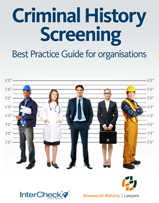
There are a range of pre-employment checks that a business may decide to use when screening its candidates. Candidate screening usually occurs so the workplace can confirm a person’s suitability for the role on offer. Screenings can also evaluate whether or not a candidate has the necessary skills and training to perform a particular role.
For many businesses, cooperation with pre-employment screening tests is a mandatory part of the application process. Of course, the type of job on offer will determine the type of pre-employment tests a workplace may decide to perform.
Here are some of the different types of pre-employment tests and checks that can be used to screen candidates for a future job position.
Police checks
Today many businesses will want to perform or ask you to provide your own police check. In certain industries, such as child care, having this done is a prerequisite during the application process.
Many businesses will want to know whether or not their potential future employee has a criminal record, as many employers feel this information will help them to be able to trust their valuable clientele with their new employee. Considering that the majority of theft in business is committed by employees, it’s also understandable why companies want to protect their valuable inventory from individuals who have a history of theft.
Sometimes employers will also check an applicant’s credit and driving history as well.
A willingness to perform pre-employment tests shows that a candidate is keen to progress to the next stage in the recruitment process. In most instances, these tests not only help to assess a candidate’s suitability for a role, but also give you an insight into their own strengths and weaknesses.
Personality tests
The objective behind these tests is to provide the employer with an insight into the individual’s style of personality, their ideal job preferences, and ultimately how well their personality traits suit the job on offer. Certain personality types suit specific jobs and work environments.
A popular personality test is the Meyers-Briggs test. This evaluates an individual by looking specifically at whether they lean towards being more introverted or extroverted, their feelings and thoughts, and how they judge and perceive certain situations. An employer may want to use this test when hiring, for example, a face to face salesperson, as someone who would succeed in this role would lean towards being more extroverted than introverted.
While this is a more in-depth evaluation, there are also shorter personality tests that are often used as well. It all depends on the employer, the role, and how badly they are looking for people with specific personality traits.
Job knowledge tests
These tests evaluate a candidate’s specific knowledge about their industry and/or the position for which they are applying. These tests may take the form of an online questionnaire at the end of a job application, a series of oral questions, or even through a formal, written exam.
Employers often use these tests to evaluate the capability of someone so as to gain an understanding of their role and knowledge of the business.
Medical checks
Sometimes employers will ask candidates to have certain medical checks done in order to confirm their physical capability to perform a job. These medical checks may look at a person’s overall health status, or more in-depth into specific markers that will determine an individual’s suitability for a specific role.
In no way is an employer allowed to use the outcome of these medical checks to discriminate against a potential employee.
Physical fitness tests
For physically demanding jobs that require employees to have a certain level of fitness, such as those in law enforcement and sports training, an employer may ask a candidate to perform a series of tasks that will measure their level of strength, cardiovascular fitness, and flexibility.
Drug tests
Many businesses today screen potential employees for illegal drug use. These tests require candidates to have their blood taken and/or urine tested by a trained technician to look at whether or not they have consumed any illicit drugs. Some tests can detect some drug use as far back as a year.
Businesses who are looking to hire someone who can work heavy machinery or require lots of driving may ask a potential candidate to perform these tests as it will limit liability in the unfortunate event that a job related accident occurs.




![[INFOGRAPHIC] Steps on assessing applicants with a criminal history](https://blog.intercheck.com.au/hubfs/Imported_Blog_Media/criminal-history-check.png)







